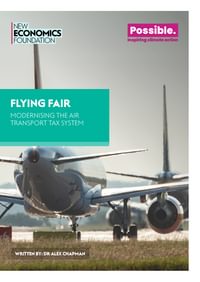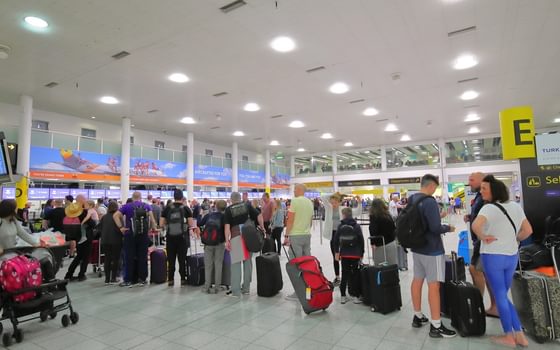Flying fair
Modernising the air transport tax system
27 May 2025
The UK’s air transport tax system demands urgent modernisation. Current tax rates are misaligned with government policy and, at a challenging time for government finances, luxury air travel is not contributing its fair share to the public purse. The current system contains perverse incentives that encourage environmentally damaging behaviour while failing to apply the ‘polluter pays’ principle to which the government has subscribed. Forecasts of future demand growth, currently being used to inform decisions such as airport expansion, are predicated on the assumption that the industry will not pay its fair share.
Governments across Europe, such as France, Germany, and the Netherlands, have begun recognising that aviation taxes must rise. A key concern, however, is the fairness of any increases. The UK government is right to recognise the social and economic importance of the UK’s air connectivity. For communities, including recent migrants, students, humanitarian workers, and others, air travel offers a vital and unquantifiable social benefit that could be harmed by a poorly thought-through aviation tax policy. This complexity, however, is not an excuse for inaction. The current system is poorly designed and is placing an unfair burden on wider society.
As this report evidences, recent growth in air travel demand has skewed heavily towards trips taken by travellers who already travel very frequently, ie sector growth does not originate from the annual family holiday. Growth derives from more frequent flyers, flying more frequently. We document the emergence of the ‘ultra-frequent flyer’. This group of individuals who fly six or more times per year (at least once every two months) make up just under 3% of the UK population but take just under 30% of all of the journeys in the UK’s air network. Contrary to popular belief, the majority of the flights taken by this group are taken for leisure, not business. The group are more likely than average to take shorter-haul flights replaceable by train journeys and much more likely to travel in business or first class.
The challenge for the government is to develop a tax system which balances competing objectives and varying levels of priority need for air travel. While it is inevitable (and accepted by the government) that charges for the carbon emitted by air travel, particularly the long-haul segment, must rise, these increases should be managed in a way that is sensitive to both the realities and optics of fairness. The UK public understands the climate imperative and is open to the price of flying rising, but they show a strong desire for infrequent travel, or the family holiday, to be protected from blunt tax measures, and for the industry itself, and its heaviest users, to shoulder the lion’s share of the transition cost.
This report explores how a package of policy-aligned tax reforms could better ensure that social (and business) air travel needs are fairly met while supporting the wider economy and respecting ecological limits. These policies aim to make the fairness of the green transition explicit. Key elements include:
- Increasing emissions charges on EU routes such that they align with the government’s Jet Zero strategy.
- Levying a carbon tax on non-EU routes to enforce the polluter pays principle and eliminate the imbalance between EU and non-EU travel incentives.
- Significantly increasing charges on luxury travel to correct the incredibly low proportionate ticket taxes applied on the most damaging forms of travel.
- Offering a ‘first-flight’ discount to all UK residents to protect the family holiday.
- Implementing a new charge on the tax return of ultra-frequent flyers taking 6 or more flights per year to encourage sustainable choices from extreme emitters.
The package proposed delivers a highly progressive distributional impact with features similar to the frequent flyer levy (FFL) argued for by NEF previously. This is secured in a manner that is easier for government to administer, and more visibly targets the most excessive forms of luxury air travel. The package of policy measures presented could raise up to £6bn per year in tax revenues and deliver up to a 28% reduction in aviation CO2 emissions by 2030 (Figure 1). These benefits are secured without any net change to the price of a UK resident’s first short-haul flight of the year.
Topics Climate change







